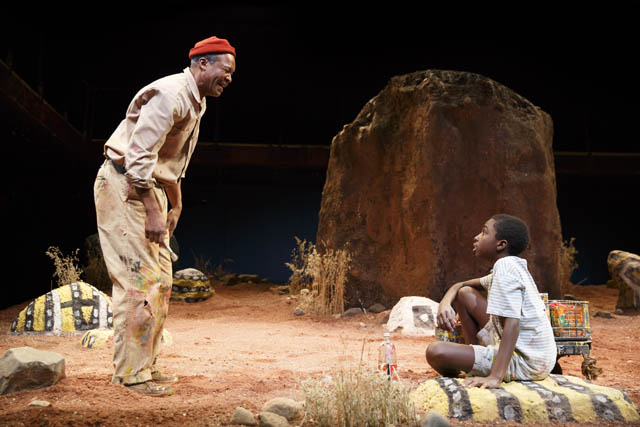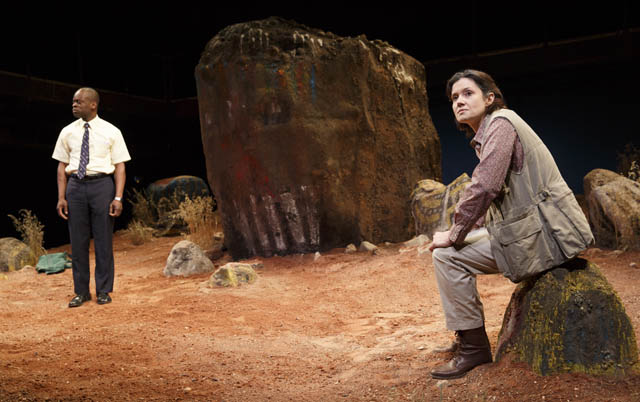
Leon Addison Brown and Caleb McLaughlin star in what might be Athol Fugard’s final play (photo by Joan Marcus)
The Pershing Square Signature Center
The Romulus Linney Courtyard Theatre
480 West 42nd St. between Tenth & Eleventh Aves.
Tuesday – Sunday through June 7, $25-$65
212-244-7529
www.signaturetheatre.org
In 2011, South African writer-director Athol Fugard won a Tony Award for lifetime achievement the day after his seventy-ninth birthday, but that hasn’t slowed down the now-eighty-three-year-old man responsible for such important plays as Sizwe Bansi Is Dead and “Master Harold” . . . and the Boys. The next year he was the Signature Theatre’s playwright-in-residence, presenting stirring revivals of Blood Knot and My Children! My Africa! as well as the New York debut of The Train Driver. He is now back at the Signature with the world premiere of The Painted Rocks at Revolver Creek, a potent tale of apartheid and its effects on three people that distills right to the core the policy of racial segregation that dominated South Africa for nearly fifty years, and its legacy today. Inspired by real-life outsider artist Nukain Mabusa, who painted flowers on rocks in a stone garden in Revolver Creek for more than a decade, the play takes place in 1981, as an elderly farm laborer (Leon Addison Brown) and his young helper (Caleb McLaughlin) prepare to paint the Big One, an enormous rock on a hill on land owned by Elmarie Kleynhans (Bianca Amato) and her husband, an Afrikaner couple who employ the man, called Tata (“father”) by the boy, known as Bokkie (“small buck”), and Outa (“old father”) by Elmarie, who uses the generic, derisive Afrikaaner terms for them rather than their names. Bokkie is eager for Tata to paint the Big One, but Outa is hesitant. “He is bigger than me. And I know that he is my last one . . . so I am frightened,” Tata says of the inanimate object. “But he is only a rock,” Bokkie explains. “I have got no more flowers in me, Bokkie,” Tata replies. However, soon Bokkie and Tata are painting the rock together, the old man sharing the story of his hard life, passing it on for future generations. “What do you see standing here? Old Man? Just another old kaffer?” he says to the rock, asserting himself for maybe the first time ever. “No, Big One, I am not old man. I am not kaffer. I am MAN.” When the religious Elmarie arrives, she doesn’t understand what Outa has painted and wants him to replace it with something much prettier. “Next Sunday, why don’t you wipe that all away and make it a big flower, your biggest flower . . . to thank the Lord for all his blessings,” she says. The old man is faced with a choice, a decision that will have great impact not only on himself but on his young friend as well.

Jonathan Sejake (Sahr Ngaujah) and Elmarie Kleynhans (Bianca Amato) argue over the new South Africa in THE PAINTED ROCKS AT REVOLVER CREEK (photo by Joan Marcus)
In the second act, it’s twenty-two years later, and the boy, now a grown teacher (Sahr Ngaujah), returns to Revolver Creek, in a South Africa that has ended apartheid and has a new constitution giving equal rights to blacks. He is met by Elmarie, who does not recognize him at first, holding a gun on him until he explains who he is and tells her why he is there. “So what gives you the right to come here and paint that rock without permission? Let me remind you, this is private property, Bokkie,” she says. “Nobody calls me that anymore, Mrs. Kleynhans. My real name is Jonathan Sejake,” he responds with pride and determination. He also explains that Tata/Outa had a name as well, Nukain Mabusa. Jonathan and Elmarie then engage in a heated verbal battle over the current state of the nation, the way things used to be, and what the future promises, arguing about land ownership, violence, and personal identity. As in the first act, Fugard, who also directed the production, includes long, sharply written monologues that both expand on the characters and serve as a microcosm for the arguments that have plagued South Africa since even before apartheid officially began in 1948. The absorbing dialogue is expertly performed by the outstanding cast, who lend nuance and believability to roles that could have been clichéd and predictable. Christopher H. Barreca’s set features an array of rocks covered in fading painted flowers, centered by the Big One, which embodies the seemingly impenetrable gap that exists between blacks and Afrikaners. Just as Tata and Bokkie gave eyes to the rock, Fugard invites the audience to see the vast intricacies of apartheid rule. He imbues The Painted Rocks at Revolver Creek with a captivating sensitivity, avoiding becoming overly treacly or didactic as the well-drawn, multidimensional characters make their cases. And although the play is specifically about South Africa, it also relates to the racial tensions that have gripped America in Baltimore, Ferguson, and elsewhere. The play is part of the Signature’s Legacy Program, and Fugard has stated that it might be his “farewell to the stage.” If that is indeed true, he has left behind quite a legacy himself, concluding with one of his most softly intelligent, illuminating works.